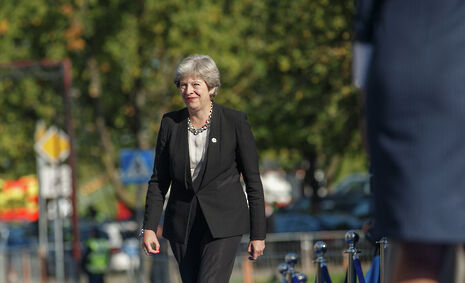Insecure work and inadequate welfare mark a return to Victorian Britain
Zero-hour contracts, weakened welfare support and homelessness are but examples of ideology by Thatcher, argues Joseph Evans

Margaret Thatcher’s legacy has plagued British society long since she left office. As one of the chief political architects of the neoliberal agenda, she instigated a socioeconomic framework that exacerbated inequality and promoted rampant individualism at the expense of community and collective wellbeing; the effects of her legacy are nowhere starker than in the increasingly visible levels of insecurity which epitomise modern employment. Thatcher advocated a return to “Victorian values” while campaigning in 1983, and in many ways, it seems that her self-proclaimed desire has come to fruition.
Emphasising the efficacy of a free market is the central facet of neoliberal ideology: Thatcher herself eulogised laissez-faire economics and its achievements. Yet it should not be forgotten that the successes of the British economy in the heyday of free-market capitalism were secured at the expense of the welfare of millions of workers, whose lives were characterised by personal economic instability and squalid living conditions. While Thatcher never managed to dismantle the framework of welfare provisions which mitigated these issues, the economic agenda that she and her successors have championed is pushing workers into ever-more insecure patterns of employment.
“The rhetoric of creating ‘greater labour flexibility’ is a façade for the sacrifice of employee security in the interest of profit margins”
With the advent of the gig economy, many workers are increasingly experiencing a return to the casual labour arrangements that typified those living on the poverty line in Victorian Britain. Zero-hour contractors are subject to inconsistent shift patterns that make it impossible to earn a reliable income. Those working for Uber and Deliveroo are not even registered as employees; their status as independent contractors allows the companies to deny them basic rights, like a minimum wage and sickness or holiday pay. When the government claims that it has reduced unemployment by fostering the conditions for job creation, as David Cameron did in 2015, it is important to remember that many of these jobs are marked by employee insecurity and wage inconsistency. Moreover, while they are convenient for some workers, particularly students and those looking to supplement their incomes, they are much more difficult to earn a stable living from. Free-market dogma is central to this form of rising social insecurity: the rhetoric of creating ‘greater labour flexibility’ is a façade for the sacrifice of employee security in the interest of profit margins.
Coupled with unprecedented wage squeezes and the erosion of welfare provisions, the pressure on workers is building immeasurably. The Coalition government’s decision to freeze benefits left millions of households who depend on tax credits to pay their bills with a financial black hole of hundreds, if not thousands, of pounds. Theresa May’s decision to maintain austerity is intensifying the problem: Shelter warned last year that freezing the Local Housing Allowance would force working families to find hundreds of pounds to pay their rent and avoid eviction. Alongside ever-rising house prices and a wage squeeze on a scale unseen since the Napoleonic Wars, these ideological, Thatcherite attempts to reduce the size of the state are accentuating the insecurities of modern life.
They also have severe human consequences. Last Wednesday, a homeless man died in Westminster tube station, minutes from the Houses of Parliament. His tragic death received particular attention from the press, but he is hardly anomalous: homelessness has doubled since the Coalition government took office and the number of children living without permanent residence now exceeds 100,000, and the figures are sadly emblematic of a socioeconomic agenda which engenders insecure employment and rolls back social security provisions. The idea that cutting benefits “incentivises” workers to “escape” poverty is farcical – it simply entrenches inequality and perpetuates an attitude towards hardship reminiscent of Victorian self-help attitudes.
Evidently, state intervention is becoming an increasing necessity. The ‘invisible hand’ of the market is inherently dehumanising, ignoring the welfare of workers in favour of business interests. Theresa May’s failure to address the legal nuance that allows companies like Uber and Deliveroo to deny their workers basic rights in her most recent labour policies must be reformed. Equally, the state must accept responsibility for the welfare of the most vulnerable in society. This means ensuring provisions for those in greatest need, likely through increased taxation, and creating secure, full-time employment rather than unstable casual contracts. Otherwise, we really do risk witnessing the advent of a return to “Victorian values”
 News / Colleges charge different rents for the same Castle Street accommodation2 March 2026
News / Colleges charge different rents for the same Castle Street accommodation2 March 2026 News / News in Brief: waterworks, wine woes, and workplace wins 1 March 2026
News / News in Brief: waterworks, wine woes, and workplace wins 1 March 2026 News / Climate activists protest for ‘ethical careers policy’1 March 2026
News / Climate activists protest for ‘ethical careers policy’1 March 2026 News / Angela Merkel among Cambridge honorary degree nominees27 February 2026
News / Angela Merkel among Cambridge honorary degree nominees27 February 2026 News / Private school teacher who lied about Cambridge degree barred from teaching27 February 2026
News / Private school teacher who lied about Cambridge degree barred from teaching27 February 2026









